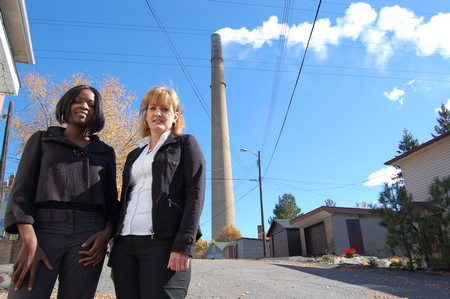 Mentoring plays a key role in retaining women in the mining industry.
Mentoring plays a key role in retaining women in the mining industry.
This was one of 10 points raised in a paper presented at the Canadian Institute of Mining and Metallurgy's (CIM) 2010 Maintenance Engineering and Mine Operators (MEMO) Conference October 27 by Vale mining engineer Theresa Nyabeze.The paper was based on feedback compiled from 153 respondents across Canada who filled out an Internet survey created to shed light on the career satisfaction of women in the mining industry. The respondents worked in mining operations, supply and service companies, government and academia.The survey was created by Nyabeze, Samantha Espley and Donna Beneteau, all Vale mining engineers. The three women are strong promoters of women in mining and engineering. They are also active participants in the Sudbury chapter of WISE, Women in Sciences and Engineering, a volunteer organization created to encourage young women to consider careers in science and engineering.
"We all recognize that the more diverse our workforce, the more diverse and better our solutions are," Espley told Sudbury Mining Solutions Journal.
Both Nyabeze and Espley chose careers as mining engineers because of family influences. Nyabeze came to Sudbury at age 13 and was influenced by her older brother, a geologist. Espley's father, who was a mining engineer, was a valuable role model during her childhood. All three women have their own families, but are at different stages in their careers. This allowed them to draw upon their different perspectives with respect to such issues as maternity leaves and return to work when creating the questionnaire.
Insights
The survey provides greater awareness of why women pursue work in the mining industry, as well as why they stay or leave. These insights may be helpful to employers interested in recruiting women.One of the key ingredients for retention of women is mentorship. It doesn't have to be formal to be effective, Espley said. "It is the informal exchanges (that are important)... having people tell you not to give up."
Other factors that influence why women remain in mining careers are progressive work policies and flexible work hours that allow them to balance their career and family life. Also important are ongoing professional development, attractive salaries and benefits, accessibility to scholarships, travel opportunities, challenging and interesting work opportunities, networking, job availability and family influence.
Conversely, the opposite of some of those factors, including the absence of a support network and inflexible work policies and culture, influenced women's decisions to leave the industry. Access to health care, especially for women with children in a remote community was a concern.
Isolation was another significant issue.
"You're one woman in a room full of men," Espley said. "It is a real sense of feeling alone. It goes back to work culture," which in mining is predominantly male-oriented.
This was one of the reasons for the establishment of WISE in 1998.
Career advancement opportunities also influenced retention. The survey reported a perception that women are not being promoted as much as their male counterparts and that women feel they must work to a different standard.
Further conversation with Nyabeze and Espley led to discussion about the importance of role modelling for young female students making career choices. Nyabeze found that when she met and spoke with girls in person, it made more of an impression.
According to Espley, Vale's human resources department was interested in the results of the survey for recruitment and retention purposes.
The study is posted on the WISE website.
www.wisecareers.ca/wisesudbury


